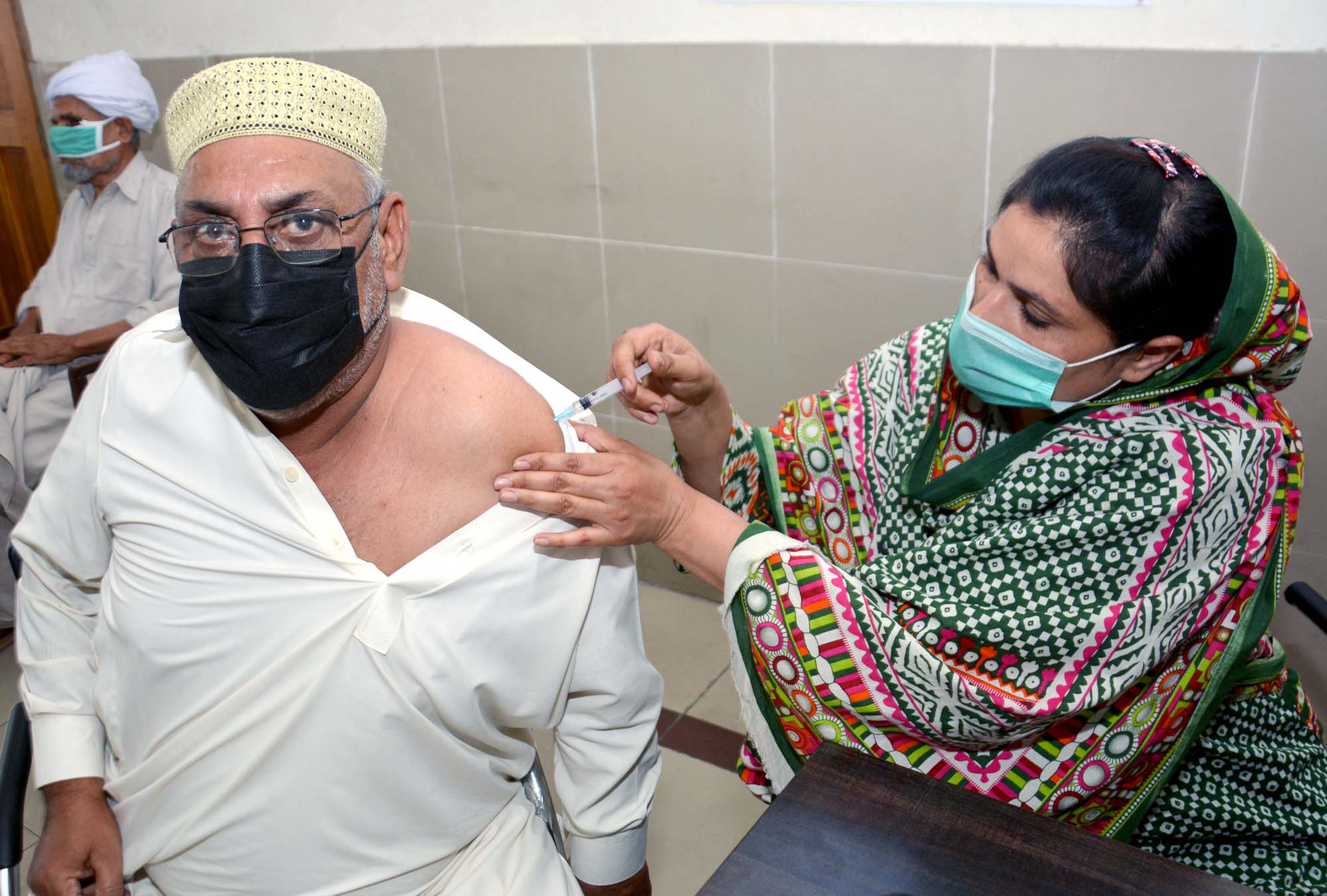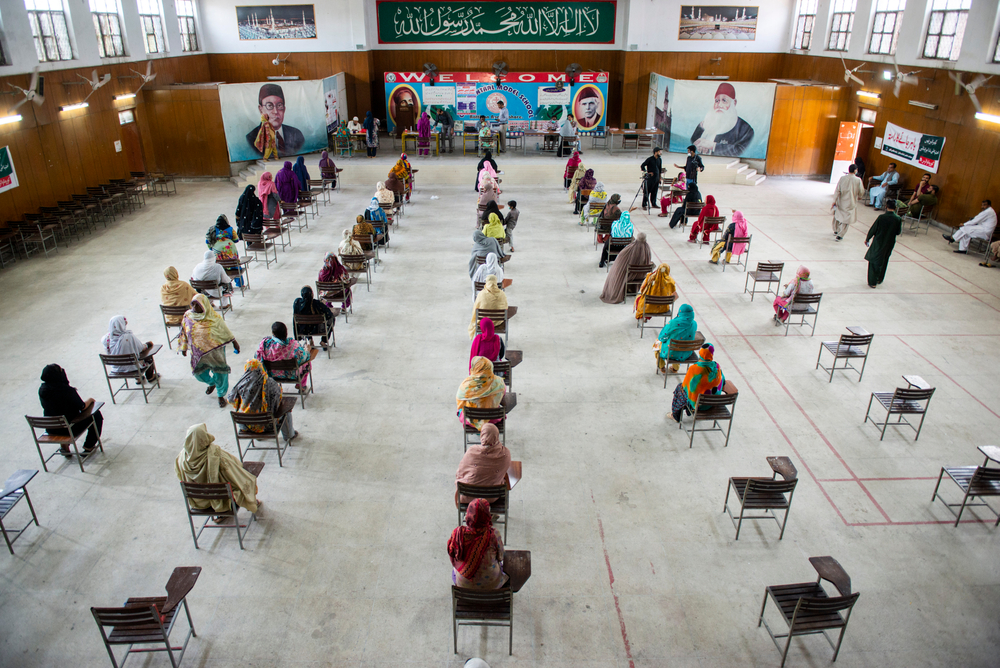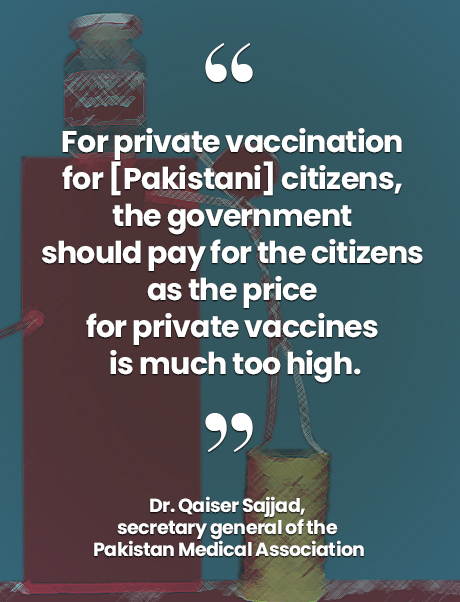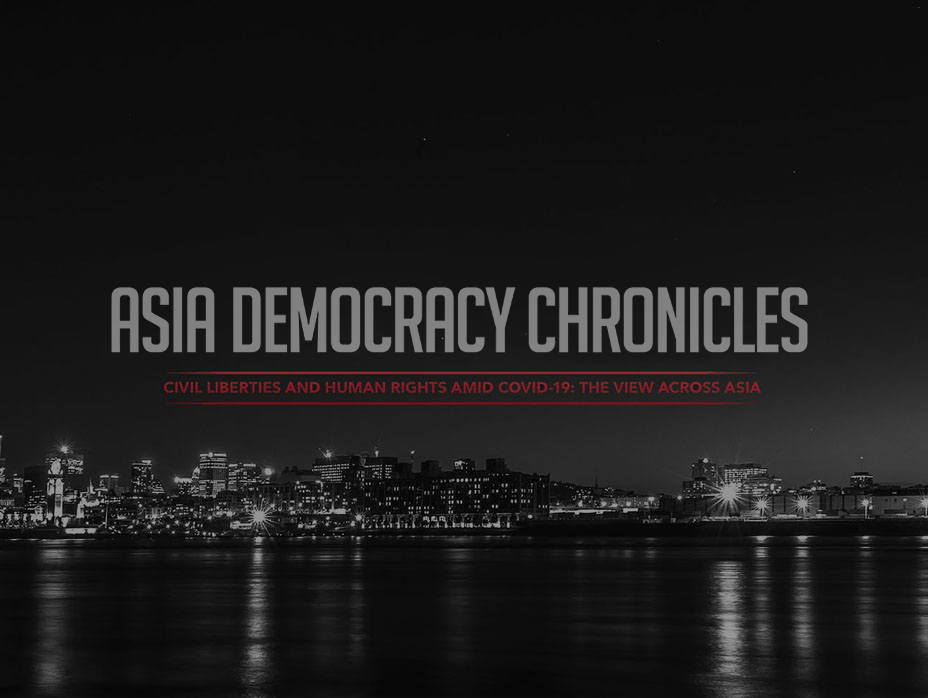The surge in the number of coronavirus cases in Pakistan has been giving Amjad Ali sleepless nights. As of May 19, more than 882,000 cases were confirmed and more than 19,000 people had died due to COVID-19.
Since Ali is only 27, he is ineligible for the state’s free vaccination for citizens 40 years old and above. So, when he learned that a shipment of 50,000 doses of privately imported Russian Sputnik vaccines arrived in Pakistan in March, he willingly paid 12,000 rupees (US$80) in advance for two doses.
Ali’s worries are far from over, though. Undaunted by the cost of the Russian vaccines, thousands of young Pakistanis thronged to private centers offering them. They waited in long queues in Karachi, Lahore, and Islamabad. The vaccines were quickly sold out.
“I paid [in full] for the Sputnik vaccines [in mid-April], but the private center now says that they are short of doses and will entertain me once the new shipment arrives,” he says. “I want to get vaccinated as soon as possible, but the availability of the vaccine is the real issue.”
Pakistan is largely reliant on the COVAX vaccine sharing initiative for poorer nations. As Reuters reports, “The COVAX program has committed 45 million doses to the country up to the end of 2021, and deliveries were meant to start in March. However, India, making the AstraZeneca vaccination, halted supplies due to its own worsening COVID-19 situation.” Health minister Dr. Faisal Sultan says, “The delay in COVAX meant that our expected volume of vaccination could not materialize in February and March.”

Pakistan’s vaccination rate is low. As of May 6, the government had vaccinated just 0.8% of its population of 216 million.
A divisive move
To cope with the shortage, Pakistan‘s government allowed the private sector to import and sell COVID-19 vaccines in March. However, the health ministry has exempted the vaccines from price caps. Health experts fear that this move will create vast inequalities in access.
The government’s move to exempt the privately imported vaccines from price caps sparked criticism. The US$80 price of the two doses of the Sputnik vaccine is beyond the reach of many poor Pakistanis. An estimated 60 million people live below the national poverty line.
CNN reports that the price of the vaccine is four times the international market price, which is less than US$20 for two doses, according to the vaccine developers. And it’s about 30% of an average household’s monthly income, which is US$273.2 (41,545 rupees), according to the most recent available data from the Pakistan Bureau of Statistics.
On March 18, Pakistan backtracked on the decision and said it would set maximum prices, reports Reuters. “The decision threw the government and pharmaceutical companies into dispute, and stalled the commercial sale of the vaccine.”
One pharmaceutical company, AGP Pharma Ltd., which had already imported 50,000 doses of the Sputnik vaccines, took the government to court. In April, the company won an interim order allowing it to sell the vaccines until pricing is decided, reports Reuters.
Osama Malik, an Islamabad-based health law expert, is concerned about the interim order. “While the federal cabinet and the federal drug regulator continue to prevaricate on this matter, the court has temporarily allowed the Sputnik vaccine to be sold to curb the virus,” he says. He adds that the duty bearers’ delays in fixing the price caps is “not understandable and should be decided quickly to avoid mounting catastrophe.”

The US$80 price of one two-dose pack of the privately imported and sold Sputnik vaccine is beyond the reach of many poor Pakistanis, such as these women waiting to receive cash from the government’s Ehsaas Emergency Cash Program.
Potential super-spreader events
Pakistan is a predominantly Muslim country where the clerics wield much influence. Since the pandemic, the authorities have avoided banning religious activities. While there are restrictions on religious gatherings, the government could not totally stop them as the people have strong sentiments attached to such gatherings.
Amid the surge of COVID-19 cases, thousands of mask-less Shiite Muslim devotees on May 4 gathered in several Pakistani cities for a religious public procession. This prompted fears among the authorities that the coronavirus may rapidly spread in the crowds in the same way that the Kumbh Mela festival neighboring India turned into a “super-spreader event.”
Throughout the holy month of Ramadan, mosques remained open for nightly prayers during which few people observed physical distancing. Outside of Ramadan, millions of people attend community prayers at mosques each week. After the prayers, many shake hands and embrace others in the congregation.
 A snail-paced process
A snail-paced process
Pakistan’s vaccination rate is low. As of May 6, the government had vaccinated 3.32 million people, or just 0.8% of its population of 216 million, reports Deutsche Welle. The percentage of vaccinations per 100 people also stands at just 1.53%, against the global average of 16.44%.
According to the Bloomberg vaccine tracker, the latest vaccination rate in Pakistan is 131,047 doses per day, on average. At this pace, it will take another 6.3 years to cover 75% of the population.
Pakistan’s snail-paced vaccination process hit another snag in March as 550 doses of COVID-19 vaccine went missing from the Services Hospital in Lahore. In addition, 350 doses of coronavirus vaccines stored at the city’s Government Mozang Teaching Hospital have “gone to waste“ because they were stored at a less than optimum temperature.
Health experts stress that Pakistan’s vaccination drive needs to speed up. Dr. Qaiser Sajjad, secretary general of the Pakistan Medical Association, says, “for private vaccination for the citizens, the government should pay for the citizens as the price for private vaccines is much too high.”
He lists some of the ways in which the government can ramp up vaccination: “End the age limit of over 40 years and introduce a uniform policy for vaccination; start vaccination beyond age limit; and ease the process by ending the Short Message Service registration and [instead] focus on walk-in vaccination so that [more] people [can] get easily vaccinated.” ●
Haroon Janjua is an independent journalist based in Islamabad, Pakistan. He writes about human rights and global affairs.
Countering misleading narratives

Pakistani health authorities should make it clear that they are listening and responding to the public’s questions and concerns.
Pakistan is one of two countries in the world where polio remains endemic. The failure to eradicate the disease from the country is primarily attributed to various conspiracy theories, write Yusra Habib Khan et al. in their paper.
During the coronavirus crisis, conspiracy theories about the COVID-19 vaccine spread like wildfire in Pakistan. Khan et al. state that “The government of Pakistan has not taken a hard line against misleading COVID-19 claims.” They share some measures to “neutralize circulating false claims against COVID-19 vaccines.”
- Mass media should avoid any exaggerated statements triggering negative perceptions related to COVID-19 among the general community. They should limit discussions on COVID-19 to healthcare professionals, rather than political or business figures.
- Since conspiracy narratives are often tied to religious beliefs, the government can involve enlightened Islamic scholars in health promotion and awareness regarding COVID-19.
- Health authorities in Pakistan must ensure the dissemination of accurate information to the public.



















